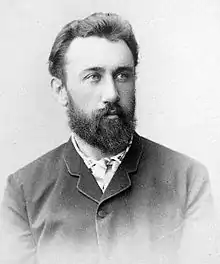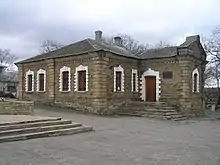Borys Hrinchenko
Borys Dmytrovych Hrinchenko (Ukrainian: Борис Дмитрович Грінченко, December 9, 1863 – May 6, 1910) was a classical Ukrainian prose writer, political activist, historian, publicist, and ethnographer. He was instrumental in the Ukrainian cultural revival of the late 19th and beginning of the 20th centuries.
Borys Dmytrovych Hrinchenko | |
|---|---|
 | |
| Native name | Борис Дмитрович Грінченко |
| Born | December 9, 1863 Kharkov Governorate, Russian Empire |
| Died | May 6, 1910 (aged 46) Province of Imperia, Italy |
| Resting place | Baikove Cemetery, Kyiv |
| Pen name | Vasyl Chaichenko |
| Occupation | prose writer, poet, pedagogue, ethnographer, historian, publicist, activist, politician |
| Language | Ukrainian, Russian |
| Nationality | Ukrainian (ethnicity) |
| Citizenship | Russian Empire (subject) |
| Alma mater | Kharkiv University |
| Period | 1880s - 1910 |
| Genre | novels, poems, articles, ballads |
| Subject | nationalism, anti-chauvinism, cultural revival |
| Notable works | To my countrymen (1898) |
| Spouse | Maria Gladylina[1] |
| Children | Anastasia (Nastya) |

Hrinchenko was an editor of various Ukrainian periodicals. He was one of the founders of the Ukrainian Radical Party. Hrinchenko also was an author of seminal ethnographic, lexicographic, and pedagogical works, literary studies, historical reviews, the first textbooks in the Ukrainian language, particularly Native word, the school-book for reading. He was an editor of the four-volume Словарь української мови (Ukrainian Dictionary; "Kievskaya starina" publishing, Kiev 1907–1909).
One of the organizers and the first director of the Prosvita Society in Kyiv.
Biography
Borys Hrinchenko was born on December 9, 1863 in the khutir of Vilkhovy Yar, in the Kharkov Governorate of the Russian Empire (today, a village of Ruski Tyshky, Kharkiv Raion), but was baptized in the Archangel-Michael church in a village of Borshcheve.[2] His father was a retired army officer of an impoverished noble heritage. His mother Poliksenia Litryova, a daughter of a colonel.[1] His family possessed 19 desyatinas (20.7575 ha (51.293 acres)) of land, mostly forest and a water mill. His father knew Ukrainian well and used it only when talked with neighboring peasants, whereas at home everyone in the family spoke Russian.[1]
Before enrolling in the Kharkiv city secondary school (so called realschule), young Hrinchenko was home schooled. At the fifth grade he was imprisoned on 29 December 1879 "for possession and distribution" of Serhiy Podolynsky's banned book "Steam Machine" (Ukrainian: Парова машина, 1875).[1] He was excluded from school and spent couple of months in prison where he became sick on tuberculosis.[1] After about a year of exile to his father's estate, he returned to Kharkiv and worked as a tutor, earning money to obtain a diploma from Kharkiv University as a people's educator.
He died on May 6, 1910 in the town of Ospedaletti in Liguria, Italy.
English Translations
English translations of Borys Hrinchenko's works include:
Bibliography
References
- Cherkaska, H. Borys Hrinchenko and his Ukrainian feat. Uamodna. 22 December 2014
- Birth certificate
- Hrinchenko, B., 1998, Brother against Brother, pp.160-217, Language Lantern Publications, Toronto, (Engl. transl.
Further reading
- Plevako, M. Zhyttia ta pratsia Borysa Hrinchenka (Kharkiv 1911)
- Smilians’kyi, L. Borys Hrinchenko. Krytychno-biohrafichnyi narys (Kharkiv 1930)
- Pohribnyi, A. Borys Hrinchenko v literaturnomu rusi kintsia XIX–pochatku XX st.: Pytannia ideino-estetychnoï evoliutsiï (Kyiv 1990)
- Statieieva, V. Ukraïns’ki pys’mennyky pro problemy literaturnoï movy ta movyznavstva kintsi XIX–pochatku XX st. (Uzhhorod 1997)
- Zhyvotenko-Piankiv, A. Pedahohichno-prosvitnyts’ka pratsia Borysa Hrinchenka (Kyiv 1999)
External links
- Hlobenko, M. Borys Hrinchenko. Encyclopedia of Ukraine
- Roszkowski, W., Kofman, J. Borys Hrinchenko. Biographical Dictionary of Central and Eastern Europe in the Twentieth Century. Routledge, 2016
- Hrinchenko's works (in Ukrainian)
- Biography and his works (in Ukrainian)
- Hrinchenko at chytanka.com (in Ukrainian)